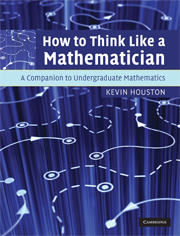Book contents
- Frontmatter
- Contents
- Preface
- I Study skills for mathematicians
- 1 Sets and functions
- 2 Reading mathematics
- 3 Writing mathematics I
- 4 Writing mathematics II
- 5 How to solve problems
- II How to think logically
- III Definitions, theorems and proofs
- IV Techniques of proof
- V Mathematics that all good mathematicians need
- VI Closing remarks
- Appendices
- Index
3 - Writing mathematics I
from I - Study skills for mathematicians
- Frontmatter
- Contents
- Preface
- I Study skills for mathematicians
- 1 Sets and functions
- 2 Reading mathematics
- 3 Writing mathematics I
- 4 Writing mathematics II
- 5 How to solve problems
- II How to think logically
- III Definitions, theorems and proofs
- IV Techniques of proof
- V Mathematics that all good mathematicians need
- VI Closing remarks
- Appendices
- Index
Summary
We have a habit in writing articles published in scientific journals to make the work as finished as possible, to cover up all the tracks, to not worry about the blind alleys or describe how you had the wrong idea first, and so on.
Richard Feynman, Nobel Lecture, 1966As a lecturer my toughest initial task in turning enthusiastic students into able mathematicians is to force them (yes, force them) to write mathematics correctly. Their first submitted assessments tend to be incomprehensible collections of symbols, with no sentences or punctuation. ‘What's the point of writing sentences?’, they ask, ‘I've got the correct answer. There it is – see, underlined – at the bottom of the page.’ I can sympathize but in mathematics we have to get to the right answer in a rigorous way and we have to be able to show to others that our method is rigorous.
A common response when I indicate a nonsensical statement in a student's work is ‘But you are a lecturer, you know what I meant.’ I have sympathy with this view too, but there are two problems with it.
(i) If the reader has to use their intelligence to work out what was intended, then the student is getting marks because of the reader's intelligence, not their own intelligence.
(ii) This second point is perhaps more important for students. Sorting through a jumble of symbols and half-baked poorly expressed ideas is likely to frustrate and annoy any assessor – not a good recipe for obtaining good marks.
- Type
- Chapter
- Information
- How to Think Like a MathematicianA Companion to Undergraduate Mathematics, pp. 21 - 34Publisher: Cambridge University PressPrint publication year: 2009



